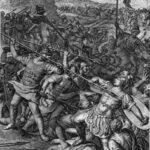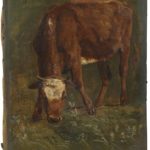When God tells Moshe his mission, Moshe is sceptical that he is capable or worthy of going to Pharaoh or freeing the children of Israel. God tells him that he will succeed ‘For I will be with you, and this is your sign that I have sent you, when you bring out the children of Israel, you will worship [the] God on this mountain’. On first glance, this looks like God is telling Moshe that the sign that he is worthy will be the subsequent revelation on Sinai, but this seems illogical since this can only happen after Moshe has already performed his mission. There are two basic ways of interpreting this verse.
- Ramban argues that Moshe was worried about two things: (i) that Pharaoh would refuse to send out the children of Israel, and (ii) that though the children of Israel would willingly leave servitude they would not follow Moshe to conquer the land of Israel. God’s answer addresses both concerns. (i) ‘I will be with you’ in overpowering Pharaoh and (ii) ‘This will be the sign’ after the exodus that proves Moshe is a true prophet and that the children of Israel should obey his commands thereafter. Rambam argues similarly (Hilchot Yesodei haTorah 8:2) that the various miracles Moshe performed in Egypt were only temporary signs of his authority, but that the absolute truth of his prophecy, and those of subsequent prophets, would only be confirmed at Sinai.
- Rashi, Rashbam, and Ibn Ezra interpret ‘this is your sign’ as referring to the burning bush itself, which is sufficient evidence that God can achieve miracles. According to Rashi and Ibn Ezra, the rest of the sentence explains God’s reason for bringing out the children of Israel, namely that they should come to Sinai. Ibn Ezra understands this as the purpose of bringing them out, while Rashi views it as the meritorious cause of their being brought out. According to Rashbam, the rest of the verse is a suggestion for what Moshe should argue when facing Pharaoh, namely that the children of Israel need to leave Egypt to serve God on the mountain.
For more on parshat Shemot, see Haggadah Berurah, the Haggadah that helps you tell the story of yetziat mitzrayim.



Leave a Reply